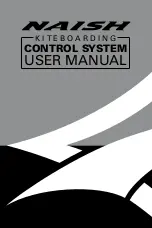
28
Contact with salt water
If salt water gets on the harness, it should be
rinsed immediately in fresh water (before it
dries) and then allowed to dry in a well-
ventilated place in the shade.
There can be permanent damage to the
fabric of the harness if it is not rinsed
thoroughly.
Repairs and inspection
Repairs
Swing workshops
All repairs and servicing should be carried
out by a Swing-authorised workshop or
directly by Swing. Swing workshops have
trained staff, original Swing parts and the
necessary know-how, all of which will ensure
top quality work.
Repairs to the airbag should only be carried
out by the manufacturer.
Small repairs to the harness
You can repair small tears in the harness
yourself using self-adhesive sail material,
provided that the tears are in places which
do not bear heavy loads, are not at the
seams and are no bigger than 3cm.
The material is available from SWING.
TIP
Swing harnesses have an accurate
identification in the rear storage
compartment or under the V-line cover,
which is obligatory for all equipment used
in aviation sports. The information
required is set out in the airworthiness
requirements.
It is helpful to provide the type
designation of the harness if you are
contacting your Swing dealer with any
queries or ordering replacement parts or
accessories
, to ensure accurate
identification.
Inspection
General
Swing’s service programme as set out in the
Maintenance and Service book should be
followed so that the same high level of flight
safety, operational safety and reliability is
ensured for your harness in the future as
well. This can be downloaded from the
Swing website under Product Information.
The inspection documentation should be
completed and signed immediately.
Failure to observe the inspection periods
renders invalid the certification and warranty.
A properly completed logbook with details
and all flying and training will help you to
comply with these periods.
Swing recommends that you send the
harness for inspection at the same time as
the wing.
Inspection periods
The following inspection periods apply in
Germany to the Connect Reverse Evo
(check the situation in your country):
Harnesses used by schools or
commercially must be inspected every 12
months from the date of purchase.
Harnesses for personal use must be
inspected every 2 years from the date of
purchase.
The harness must be inspected after 150
hours of use (including ground handling)
if this occurs prior to the period given in
a) and b) above.
Ground handling time must be at least
doubled when calculating the total hours of
use because of the increased wear and tear
on the harness
.





































